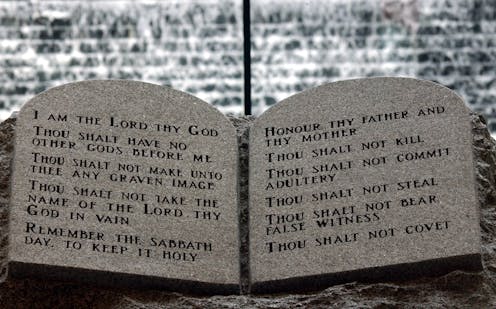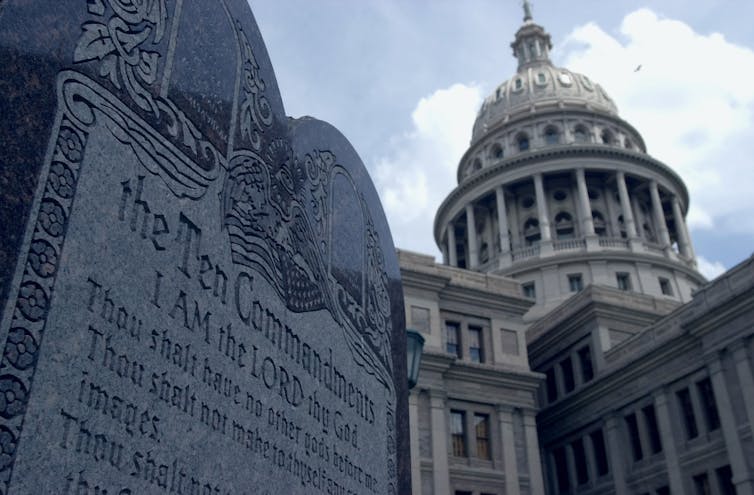An American flag, a pencil sharpener − and the 10 Commandments: Louisiana’s new bill to mandate bibl
The Supreme Court’s approach toward religion in schools has been shifting, creating uncertainty about legislation such as Louisiana’s.

Louisiana is not a stranger to controversy over religion in schools. In 2023, it joined almost 20 states that require or allow officials in public schools to post the national motto, “In God We Trust.”
Now, the Bayou State could become the first in the nation to require the posting of the Ten Commandments in classrooms in public schools, colleges and universities.
Lawmakers approved House Bill 71 on May 28, 2024, though Gov. Jeff Landry has not yet signed it into law. The bill would require officials in public schools, including colleges and universities, to post a specific version of the Ten Commandments. The text is similar to the King James translation of the Bible used in many Protestant churches.
Officials must post a context statement highlighting the role of the Ten Commandments in American history and may also display the Pilgrims’ Mayflower Compact, the Declaration of Independence and the Northwest Ordinance of 1787, a federal enactment to settle the frontier – and the earliest congressional document encouraging the creation of schools.
One of the bill’s supporters, state Sen. J. Adam Bass, defended it on the grounds that its “purpose is not solely religious.” He told fellow lawmakers that the Ten Commandments are important because of their “historical significance, which is simply one of many documents that display the history of our country and foundation of our legal system.”
As someone who teaches and researches law around religion and education, I believe the bill is problematic. It is likely to invite litigation at a time when the Supreme Court’s thinking on religion and state is shifting.
How SCOTUS has ruled before
Litigation over the Ten Commandments is not new. More than 40 years ago, in Stone v. Graham, the Supreme Court rejected a Kentucky statute that mandated displays of the Ten Commandments in classrooms.
The court reasoned that the underlying law violated the First Amendment’s establishment clause – “Congress shall make no law respecting an establishment of religion” – because the mandate lacked a secular purpose.
The justices were not persuaded by a small notation on posters that described the Ten Commandments as the “fundamental legal code of Western Civilization and the Common Law of the United States.”
Twenty-five years later, the Supreme Court again took up cases challenging public displays of the Ten Commandments, although not in schools. This time, the justices reached mixed results.
The first arose in Kentucky, where officials had erected a county courthouse display about texts including the Ten Commandments, the Magna Carta, the Declaration of Independence and a biblical citation. In a 2005 ruling in McCreary County, Kentucky v. American Civil Liberties Union of Kentucky, the five-person majority agreed that display of the Ten Commandments violated the establishment clause, largely because it lacked a secular legislative purpose.
On the same day, however, the Supreme Court reached the opposite result in Van Orden v. Perry, a case from Texas. The court upheld the constitutionality of a display of the Ten Commandments on the grounds of the state capitol as one of 17 monuments and 21 historical markers commemorating Texas’ history.
Unlike the fairly new display in Kentucky, the one in Texas, which had existed since the early 1960s, was erected using private funds. The court permitted the Ten Commandments to remain because, despite their religious significance, the monument was a more passive display than in Stone: spread out across 22 acres, rather than posted on the courthouse door.

Louisiana’s law
Louisiana’s bill would require public school officials to display framed copies of the Ten Commandments in all public school classrooms. Posters must be at least 11-by-14 inches and be printed with a large, easily readable font. The proposal allows, but does not require, officials to use state funds to purchase these posters. Displays can also be received as donations or purchased with gifted funds.
The bill’s author, state Rep. Dodie Horton, previously sponsored Louisiana’s law mandating that “In God We Trust” be posted in public school classrooms.
In defending the Ten Commandments proposal, she said it honors the country’s religious origins.
“The Ten Commandments are the basis of all laws in Louisiana,” she told fellow lawmakers, “and given all the junk our children are exposed to in classrooms today, it’s imperative that we put the Ten Commandments back in a prominent position.”
Justifying the bill, Horton pointed to Kennedy v. Bremerton School District, a 2022 Supreme Court decision. Here, the justices held that educational officials could not prevent a football coach from praying on the field at the end of games, because he engaged in personal religious observance protected by the First Amendment.
“The landscape has changed,” she said.
New frontier
Indeed it has.
For decades, the Supreme Court used a set of criteria often called the Lemon v. Kurtzman test to assess whether a government action violated the establishment clause. Under this test, when a government action or policy intersects with religion, it had to meet three criteria. A policy had to have a secular legislative purpose; its principal or primary effect could not advance religion; and it could not result in excessive entanglement between state and religious officials.
Another test the Supreme Court sometimes applied, stemming from Lynch v. Donnelly in 1984, invalidated governmental actions appearing to endorse religion.
The majority of the current court, though, abandoned both the Lemon and endorsement tests. In the majority opinion in Kennedy v. Bremerton, Justice Neil Gorsuch wrote that “the Establishment Clause must be interpreted by ‘reference to historical practices and understandings.’” He added that the court “long ago abandoned Lemon and its endorsement test offshoot.”
What that new standard means remains to be seen.
In my view, the bill’s supporters’ reliance on Kennedy is mistaken. That decision upheld voluntary, private prayer, not mandated postings of religious statements, overlooking many students’ beliefs.
More than 80 years ago, in West Virginia State Board of Education v. Barnette the Supreme Court decided in a 6-3 opinion that students cannot be compelled to participate in saluting the American flag, including the words “under God” in the Pledge of Allegiance, if doing so goes against their religious beliefs.
Under Louisiana’s new bill, students need not recite the Ten Commandments. Yet, given their distinctly religious message, I believe House Bill 71 faces a dubious future if signed into law.
Charles J. Russo does not work for, consult, own shares in or receive funding from any company or organization that would benefit from this article, and has disclosed no relevant affiliations beyond their academic appointment.
Read These Next
Crowdfunded generosity isn’t taxable – but IRS regulations haven’t kept up with the growth of mutual
Some Americans are discovering that monetary help they received from friends, neighbors or even strangers…
How transparent policies can protect Florida school libraries amid efforts to ban books
Well-designed school library policies make space for community feedback while preserving intellectual…
Colleges face a choice: Try to shape AI’s impact on learning, or be redefined by it
Colleges and universities are taking on different approaches to how their students are using AI –…






